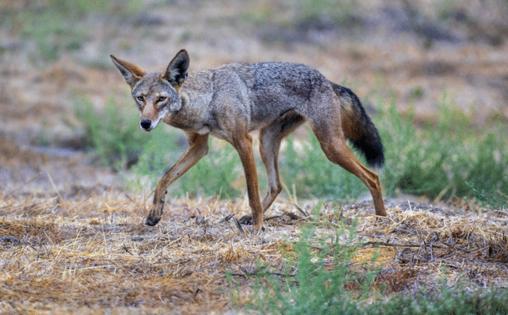Proposal to limit hunting of coyotes draws ire of California ranchers, farmers
Published in Science & Technology News
A proposal to regulate the killing of coyotes in California has drawn fierce opposition from ranchers and farmers, who say they need to be able to control the wild canines to protect livestock and pets.
Dozens of people whose livelihoods rely on California’s broad range lands are expected to pack a hearing in Sacramento on Thursday before a committee of the California Fish and Game Commission on whether to remove coyotes from a list of animals that state regulations say can be killed “at any time of the year and in any number.”
The meeting comes at a time of rising tensions between livestock owners and conservationists over the difficulty of managing predators, including the state’s rising population of gray wolves, which are protected under both the state and federal endangered species acts and cannot be killed unless they are a direct threat to a person.
Last year, a man was killed by a mountain lion in El Dorado County and, in 2023, a Downieville woman was “eaten alive” by a black bear, Sierra County Sheriff Mike Fisher said. In March alone, wolves killed at least eight calves in California’s northern ranchland, and possibly a ninth, state records show. On Wednesday, officials in Yuba County said they euthanized a mountain lion that had entered a residential property in Camptonville where a day care facility was located, killing four domestic goats.
“This isn’t just coyotes in a vacuum,” said Kirk Wilbur, a lobbyist for the California Cattlemen’s Association, which opposes protections for the doglike predators.
An estimated 250,000 to 750,000 coyotes live in California, according to previous Bee reporting, and in addition to harassing farm animals they have posed problems in urban areas as well, sometimes attacking pets or biting people.
The coyote proposal, which is in early stages and not in detailed form, has won the backing of animal rights and conservation groups, who say coyotes are native to California and serve a vital role in the state’s ecosystem. The commission’s Wildlife Conservation Committee already passed it once in January, but when their recommendation came before the full commission, members sent it back amid an uproar from farmers, ranchers and rural politicians, who said they were blindsided by it.
California has long regulated the killing and trapping of many wild animals, requiring permits and proof that a mountain lion or bear has killed livestock or threatened humans before it can be euthanized. It is illegal to trap animals for their fur, and there are generally restrictions on hunting animals designated as game, such as limiting the number and time of year when they can be killed.
But some, including pigeons, weasels, skunks, coyotes and most rodents, are excluded from such rules.
Animal rights groups say it’s time for coyotes to be removed from that list.
“We would like to see a restricted hunting season so that, for example, coyotes could not be killed during the pup rearing season,” said Camilla Fox, executive director of the organization Project Coyote.
When their parents are killed, the orphan pups are left to starve, she said, “causing extreme suffering for these highly social animals.”
David Parsons, a wildlife biologist who serves on the Science and Ethics Advisory Board for Project Coyote, plans to testify on Thursday that coyotes are essential to the ecosystems in which they live, according to an advance copy seen by The Sacramento Bee. “They help regulate rodent populations, support, songbird diversity, and contribute to the overall health of their ecosystems,” his testimony said.
In addition, coyotes actually evolved to reproduce more if their numbers are diminished, Parson’s prepared testimony said, rendering aggressive efforts to thin their population counter-productive.
The animal rights group People for the Ethical Treatment of Animals has also protested the trapping and killing of coyotes, leading to news coverage and a state investigation into a Southern California trapper.
“Allowing the indiscriminate and unlimited killing of coyotes runs counter to sound science and to Californians’ humane values,” Jenny Berg, California state director for Humane World for Animals, formerly the Humane Society, wrote in a letter supporting the change. “Rather than mass killing coyotes — which never works — we must instead focus on more humane and effective methods for minimizing rare conflicts with them.”
But Wilbur of the Cattlemen’s Association said that ranchers are not indiscriminately killing coyotes in the first place. Rather, he said, ranchers see value in the animals most of the time, because they eat rodents and other pests. But during the calving season, they can turn to livestock, he said.
Limitations on killing or hunting coyotes during that period would mean that ranchers could not protect their animals, he said.
“You’ve got to have some mechanism by which ranchers can protect their property, keep it from being killed or injured,” he said.
_____
©2025 The Sacramento Bee. Visit sacbee.com. Distributed by Tribune Content Agency, LLC.







Comments